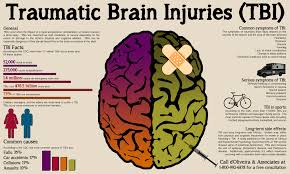
Even if we were not personal injury attorneys, we would urge anyone who suffers a serious blow to the head to get checked for a concussion. Traumatic brain injuries (TBIs) occur more often than almost anyone realizes, and the symptoms may take hours or days to fully emerge. Worse, concussion symptoms may linger for weeks or months, making it difficult for adults to work and children to study.
LEARN MORE
- Symptoms After a Car Crash That Could Indicate a Concussion
- There Is No Such Thing as a Mild Concussion
- How Can I Prove Someone Else Caused My Traumatic Brain Injury?
According to the most-up-to-date data, the Centers for Disease and Prevention estimates that during 2014, “about 2.87 million TBI-related emergency department visits, hospitalizations, and deaths occurred in the United States, including over 837,000 of these health events among children.” Out of those cases, “TBI was diagnosed in approximately 288,000 hospitalizations, including over 23,000 among children. These consisted of TBI alone or TBI in combination with other injuries.”
Sports-related concussions, particularly those incurred by football and soccer players, regularly make headlines. The leading causes of concussions and other traumatic brain injuries, however, are falls and motor vehicle crashes—especially when a car or truck strikes a pedestrian, motorcycle rider or bicyclist.
Diagnosing a concussion can be difficult. Victims rarely lose consciousness, and the typical conception of a TBI requiring a skull fracture is far from reality. The damage to the brain that produces concussion symptoms occurs when the brain slams against the inside the skull.
Questions a doctor will ask when determining whether a patient has suffered a TBI include
- What happened to possibly cause a concussion? That is, was the patient involved in a fall, crash, sporting event, etc.?
- Does the patient have a history of concussions? A previous TBI makes a person more prone to suffer subsequent TBIs, often with worse symptoms.
- Has the patient been treating themselves for concussion symptoms such as headaches and fatigue?
- Can the patient remember specific details about the incident that may have inflicted a concussion? Being unable to recall the moments before an accident, the accident itself or the period immediately following the accident are common for concussion victims.
- What symptoms has the patient experienced? Concussion victims most often report headaches, dizziness, nausea, loss of balance, difficulty concentrating and blurred vision.
- Has the patient or the patient’s friends, coworkers and family noticed changes in the patient’s mood and habits? A TBI can make it difficult for a person to control their emotions, disrupt sleep and produce anxiety and confusion.
- Have the symptoms caused the patient to miss work or school?
- Have the symptoms persisted and/or grown worse?
- Have any symptoms improved?
The answers to each of these questions will matter greatly for diagnostic and treatment purposes. An insurance company or civil trial jury deciding on a personal injury claim will also want to know the answers.
EJL